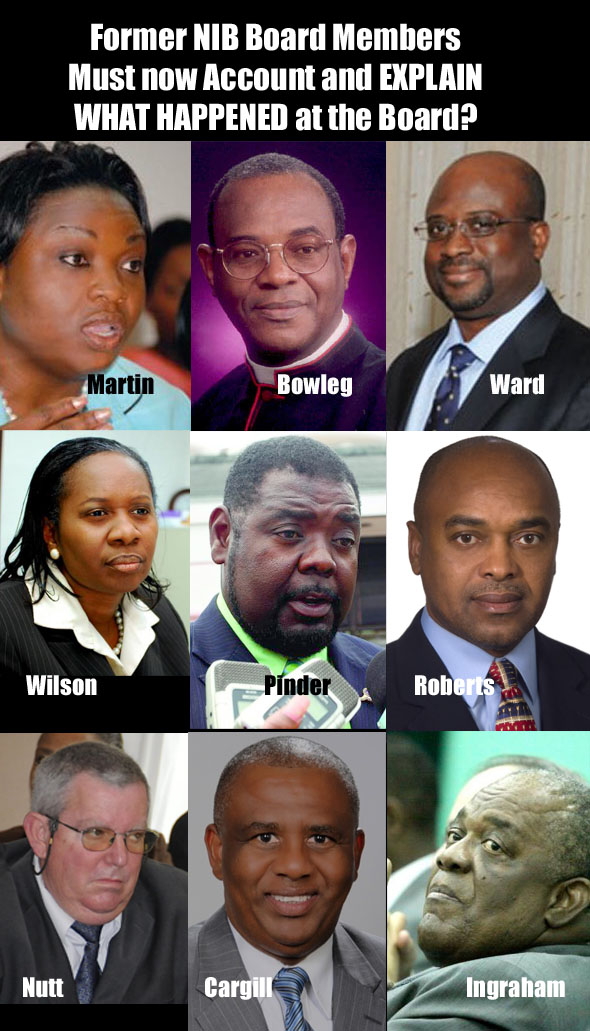Here is why the Government cannot approve the Cable Bahamas acquisition of a US-based Cable Company…Questions loom large as another backside rape is being committed against the Bahamian people!

NIB may suffer financial losses in Cable Bahamas Acquisition – We hope the Forensic Auditors covered NIB carefully in the interest of the public…


Nassau, Bahamas — Cable Bahamas has set a deadline to acquire Summit Broadband, “Accordingly, under the terms of the agreement, in the event the plan of merger is not consummated on or before December 15, 2012, Summit Broadband may, in its sole discretion, terminate the agreement and require Cable Bahamas to pay a substantial break-up fee.” This means that Mr. Keeping and Mr. D’Arville can collect money from Cable Bahamas if the deal isn’t closed by December 15 2012?
Whose interests are the Chairman and Director protecting theirs or the Bahamian public?
This is a blatant conflict of interests where is the NIB representative to protect its investment in this company?
· Why is the closing date for the sale and purchase of Summit Broadband on December 15th 2012 a Saturday? Saturday is a peculiar day for such time sensitive transactions.
· Upon the completion of the acquisition of Summit Broadband Cable Bahamas is expected to make significant capital investments to help Summit complete its network. Why buy a company for potentially millions who doesn’t have a complete network operational?
· According to Manta.com NuVu has been in business for two years with a staff complement of 8, estimated annual revenues of $530,000 and in a single location. Similarly, Marco Island Cable has been in business of 18 years with a staff compliment of 8, estimated annual revenues of $760,000 and in a single location. Both businesses list its president as William Gaston. If these are the businesses been acquired by Cable
Bahamas they don’t appear on the surface to be very profitable to command such high sales price and values.
· So, Cable Bahamas is spending $65 Million for Summit Broadband whose directors and shareholders sit on Cable Bahamas’s board, Marco Island Cable and NuVu. Who is doing these valuations and are the Bahamian shareholders getting a raked over the coals?
· When you look at the alleged websites of Summit Broadband (http://www.summit- broadband.com/), US Metropolitan Telecoms (http://www.usmetrotel.com/), Marco Island Cable (http://www.marcocable.net/) and NuVu (http://www.nuvuweb.com/), do they project the images of companies that would attract $89 million buyout offers?
Cable Bahamas is also acquiring a third Florida business called US Metropolitan Telecom for $24 million. According to Manta.com:
· US Metropolitan Telecoms LLC has been in business for five years with a staff compliment of 5, estimated annual revenues of $400,000 and in a single location. Executives include Mr. Frank Mambuca President and Mr. Joshua Lippert Vice
President.
· Again who is valuing these firms for Cable Bahamas to pay such prices? Has the NIB representative who sits on the Cable Bahamas board questioned these transactions?
· Allegedly, Cable Bahamas is spending $89 million dollars to acquire these companies using debt, new stock and asset leveraging. This can negatively affect the Cable Bahamas’ balance sheet. Cable Bahamas’ quarterly report as at March 2012 it shows total assets of $220 million with bank debt and preference shares liabilities of $104 million.
NIB holdings in Cable Bahamas stand at 22% and its representatives need to take Cable Bahamas’ board to task for these acquisitions and the subsequent financing arrangements.
Ultimately, if the share price depreciates or is diluted NIB may suffer financial losses.
Observations:
· How can Cable Bahamas allow such conflict of interests, collusion and self-dealing by
Mr. Philip Keeping and Mr. Troy D’arville as both men are directors and shareholders in
Summit Broadband and sits on the board of Cable Bahamas?
· The financing to acquire US Metropolitan Telecom, Marco Island Cable, NuVu and Summit Broadband is heavily debt laden?
· Is Cable Bahamas’ petition for an $8 increase a mechanism to fund these investments to allow Bahamian consumers to enrich Mr. Philip Keeping and Mr. Richard Pardy again?
· How has NIB the largest single shareholder in Cable Bahamas protected the Bahamian people’s money in reference to this deal that may lead to share dilution and price depreciation?
· Has BISX, the Securities Commissions and other regulatory bodies who oversee these deals to call into account the board of Cable Bahamas?
· Did Cable Bahamas called an extraordinary meeting to get input from its shareholders and broad consensus on these acquisitions or was this purely driven by its board?
· When you visit some of the websites of these companies been acquired there is little to no information on ownership, market penetration or share, financial or vision strategy?
· Allegedly some of these companies been acquired appear to have been in business less than six years? How are they been priced? Allegedly, Marco Island Cable has been in business for 18 years and has eight employees with revenues of $760,000 according to Manta.com. If after 18 years this is the level of Marco Island Cable profitability, how will Cable Bahamas expand this business for growth?
· Was the NIB board advised by their representative on Cable Bahamas’s board of these investments and the apparent dual directorships and shareholdings by Mr. Philip Keeping and Mr. Troy D’arville?
· Why did Cable Bahamas allow a potential penalty to be imposed on it if it did not close the deal with Summit Broadband by December 15 2012 whose principals/shareholders/directors are Mr. Richard Pardy, Mr. Troy D’arville and Mr. Philip Keeping? What is the rush? Is this penalty also in the contracts to acquire the other Florida Assets?
· Are these Florida assets mature companies generating significant cash-flows to be self- sustaining and defray the acquisition costs?
· Summit Broadband has stated that Cable Bahamas after acquisition will have to invest further to help it complete its Orlando network? What is the cost to do this and how will Cable Bahamas generate additional capital to do this?
· What is the critical mass or mass appeal of these Florida assets? Have you heard of these companies before now? Where is the marketing?
· It appears that US Metropolitan Telecom has won a local award as small business of the year 2012. However, Cable Bahamas is spending $24 million for this small business and there is no financial information on its website detailing its profitability or asset pool.
· “Tribune business understands that more information will be provided to shareholders once US and Bahamian regulatory approvals are received, and many institutions will likely be pitched to as part of its preference share issue.” How is it a public trading company that is 100% Bahamian owned will provide more information after they have acquired assets? Where is the transparency in these matters and where are the local regulators demanding such?
· Is Cable Bahamas doing a “CLICO 2.0” on its shareholders? Clico used Bahamian investors to purchase a Florida asset “Wellington Preserve” and leveraged itself until it eventually became unsustainable and lead to its demise. These Florida companies are been acquired for $89 million while Cable Bahamas is asking for a price increase of $8 on its basic cable service without any added value to its consumers that would generate an estimated $8.3 million per year.
· Who were the members of the Cable Bahamas’ “Special board committee” that approved the purchase of Summit Broadband knowing full well that Mr. Philip Keeping and Mr. Troy D’arville are both directors and shareholders on both companies?
· The technology market may become more competitive as BTC/LIME enters into television and better internet technology. There will also be other technology providers enter this market. What are the long-term risks if these acquisitions do not produce as projected? What does Cable Bahamas have in reserves to service its debt obligations?
· These investments on the surface may be perceived as pawns in a “Pump and Dump” business ploy. You simply pump some capital in a business and then dump it for more money on an unsuspecting buyer. Mr. Keeping in 2004 sold his shares to Mr. Paddick who then sold it back to Cable Bahamas in 2009 with a 30% above the market share price. Now Mr. Keeping and Mr. Pardy cofounders of Cable Bahamas in 1994 along with Mr. D’arville are selling to Cable Bahamas Summit Broadband allegedly a three year old company without a complete build out network, in need of immediate capital infusion that the board of Cable Bahamas has not revealed how much that capitalis?
The deal has been fast tracked with a deadline for December 15 2012 that has stiff penalty fee that only appears that Cable Bahamas is on the hook for even though this a two party deal. Who negotiated the terms of reference for this deal?
Did the NIB representative question these corporate, finance and operational issues?
· Why did Cable Bahamas agree to pay Summit Broadband a “Break Up fee” if the acquisition of Summit Broadband was not consummated by December 15, 2012? Does Cable Bahamas have control of the FCC and other regulatory bodies to ensure they meet this deadline? Why was this included in the sales agreement? Why is Cable Bahamas liable and not both parties? Why when questioned about the size of the break up fee, Cable Bahamas’s potential exposure and how confident they are to avoid this fee Mr. Anthony Butler refused to divulge any information?
· There is very little information stating publically whether the acquisitions of US
Metropolitan Telecom, Marco Island Cable, NuVu and Summit Broadband are all 100%.
Can you imagine if Mr. Keeping retains a minority interest in Summit Broadband, gains interest in Cable Bahamas through the issuance of common shares by Cable Bahamas for the purchase of Summit Broadband and keeps his chairmanship of Cable Bahamas? Are there provisions in place to ensure such a scenario does not play out and Mr. Keeping wields incredible influence on the company he sold in 2004?
· Will the management of the Florida assets acquired by Cable Bahamas be populated by Bahamian executives to oversee their operation and investment? Will NIB as the largest shareholder in Cable Bahamas be allowed to influence who serves as directors on these newly acquired businesses?
· These matters should cause all shareholders of Cable Bahamas to examine its board and ensure it will look after their interests and not those of its directors who may be profiting through self-dealing, collusion and conflicting interests!! Sounds similar to the NIB board in reference to the executive bonuses.
· The Bahamas Government is considering the formation of Pension Commission of the Bahamas that will be guided by legislation to protect and reform pensions. It will be designed to monitor and regulate pension funds to avoid the current City Markets ordeal.
How will this commission and the subsequent legislation affect how NIB funds are utilized by the Government if they are determined to be counterproductive to NIB investment objectives? Will the commission be able to block such said investments?
Board or Bored Oversight?
From January 2010 to May 2012 almost $724,000 was doled out to executive management without full disclosure. It appears the former chairman of NIB is the only member who has publicly admitted he is aware of the executive bonuses. It also appears he may have authorize these executive bonuses without the full knowledge or support of the board he chaired.
· Mr. Zhivargo Laing former Minister of State for finance with responsibility of NIB was not aware of the bonus scheme. Mr. John Pinder, Mr. Robert Sands and Mrs. Nicole Martin all former board members were not aware of these bonus payouts. Other directors Wilson, Bowleg, Nutt and Diah had no comment as it relates to this matter.
Observations:
· Was the NIB board derelict, deceived or disengaged as it relates to the executive bonuses?
· Will those who were party to these transactions be sued for breach of fiduciary duties and made liable to repay the funds used for these bonuses if these payments were not authorized properly? Most directors of companies have professional indemnity insurance to handle such claims if they arise.
· The NIB satire shows that Governments must put credible individuals on these boards that understand the business and possess the financial wherewithal to detect abuses.
· Is the NIB board aware of the potential risks Cable Bahamas is undertaking to expand internationally?
· Is NIB comfortable with the inherent conflict of interests and enrichment of Cable Bahamas directors through the acquisition of Summit Broadband?
· Is the Minister responsible for NIB aware of the Cable Bahamas deals and its implications to NIB investment there?
· In light of Cable Bahamas’s board admission of the dual roles of directors Messer’s Keeping and D’arville shouldn’t this be a cause of concern for NIB with the board of Cable Bahamas and conduct a review to ensure that these Florida assets represents good investments and are sustainable?
· Is it possible that with Mr. Philip Keeping, Mr. Richard Pardy and Mr. Troy D’arville through the acquisition of Summit Broadband by Cable Bahamas gain greater influence in Cable Bahamas because of the shares that will be issued to buy Summit Broadband? Is the shares been issued by Cable Bahamas to acquire Summit Broadband significant enough that if Mr. Keeping, Mr. D’arville and Mr. Pardy collectively can wield undue influence and control the board from here on in? Thereby, diminishing the influence NIB has on the board.
· The board of Cable Bahamas appears to be comfortable with the Summit Broadband deal? Are there any other deals that may have directors directly or indirectly profiting?
· Who is now on the board of Cable Bahamas to represent NIB since Mr. Cargill is on administrative leave and Cable Bahamas is moving with haste to acquire Florida assets?
· These Florida companies been acquired by Cable Bahamas are they competitive against the likes of Verizon, Comcast, Direct TV or Dish Network? What is their market penetration, market share or distribution network?
· Are these Florida companies been acquired by Cable Bahamas “City or County
Centric”? Do Marco Island Cable and NuVu exist in Pensacola? Where else does
Summit Broadband operate beyond Orlando? Does US Metropolitan Telecom provide services throughout Florida?








Well Ms Cunningham all we know is this, we can only do the investigation and have the materials presented. You can bring the horse to the water, but you cannot force him to drink!
BP
This is very interesting. It appears that once these companies are purchased out of the jurisdiction, the funds are out of the reach of the Bahamian people and indeed NIB is the people’s money. This would be a worst debacle than CLICO in that CLICO did not have 22% of NIB’s money. CLICO primarily had the individual’s personal funds. The Government of the Bahamas ought not to approve the sale. On another note, the penalties simply seem to be a way of the individuals enriching themselves at the expense of the shareholders.
Comments are closed.